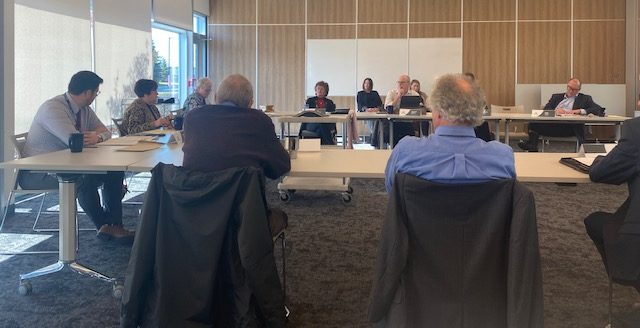
Health unit board members discuss the pros and cons of drug decriminalization after a presentation outlining the potential benefits was given by staff members. Photo by Jordan Mills, QNet News
By Jordan Mills
BELLEVILLE – Hastings-Prince Edward Public Heath board members have decided they’re not yet ready to support decriminalization of drug possession.
At a meeting Wednesday, staff members gave a report on substance use and its related harms. The report outlined the benefits of decriminalization for the drug user and the community. If it were instituted, instead of facing potential jail time, fines or charges, the person possessing drugs would be given access to therapy and other treatment methods. The Canadian government is looking at decriminalization for small amounts of some drugs, and has already given British Columbia permission to do so as of Jan. 1. Toronto has filed for the same exemption.
Portugal was used as an example of where decriminalization works. That country has seen a decrease in HIV cases, overdose deaths and drug-related criminal offences in the 20 years since decriminalization came into effect, according to the report the board received Wednesday.

Staff members of the health unit give a presentation on drug decriminalization. The report took a month to assemble and will be brought up again in February when the new board first meets. Photo by Jordan Mills, QNet News
The board was asked to vote on sending a letter to the federal minister of health, Jean-Yves Duclos, to show Hastings-Prince Edward’s support of decriminalization. But after a substantial debate, only one board member voted in support of sending the letter. Instead, the board decided to revisit the issue early 2023 after consultation with police, hospitals and emergency services.
Dr. Jeffrey Allin, a provincial appointee to the board, said he sees the benefits of decriminalization but has some concerns.
“Making this a health issue instead of a criminal issue is beneficial to the police force” because it would reduce the burden on them, Allin said. “But what does this mean for those in health services? We are already seeing a shortage of doctors and other health-care professionals. Would this not cause them to be more overworked?”
Terry Cassidy, a councillor from Quinte West, said he was concerned that decriminalization might lead to more drug overdoses. He asked whether local emergency services have enough of a supply of Naloxone, the emergency drug that treats overdoses. Dr. Ethan Toumishey, the medical officer of health, said that all emergency services in the Hastings-Prince Edward region can get Naloxone if they wish, although currently Belleville and Bancroft are the only municipalities whose emergency services carry the drug.
Belleville Coun. Sean Kelly said he thinks police and hospitals should be involved.
“We aren’t alone in this process and the police chief should be involved in this vote,” said Kelly. “Both the police force and the hospitals should be made aware of this letter before we send it to the minister.”
Talking reporters after the meeting, Toumishey said, “When advocating for decriminalization, we look for the impact substance use has on the community. Decriminalization is one component of a multi-pronged approach on how to reduce the harm substances cause in our community … We will be liaising with our community partners to find the best approach.”
Wednesday’s meeting was the last one for the board; following the recent municipal election, new members will be named. The board voted to have the question of the letter to Duclos be brought up again in February when the new board has its first meeting. Before then, potential decriminalization will be discussed with the heads of emergency services in the region to get their thoughts on the issue.
 Print This Post
Print This Post






